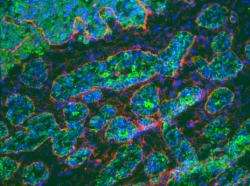Researchers identify skin cancer genes

(Medical Xpress) -- The genes which contribute to the most frequently occurring life threatening form of skin cancer have been identified for the first time by a research collaboration between the University of Dundee and scientists at Harvard and University of California, San Francisco.
Cutaneous squamous cell carcinoma (cSCC) is the most frequently occurring life threatening skin cancer. Unlike other common skin cancers, such as Melanoma and Basal Cell Carcinoma, the genes which are frequently mutated in cSCC have, until now, been unknown.
Now the researchers at Dundee, Harvard and UCSF have identified two highly related genes which are mutated in three quarters of all cSCC cases. The gene mutations are also active in a significant proportion of SCC cases in the lungs.
The identified genes are known as 'NOTCH' and the mutations are thought to inhibit normal barrier development, important processes in both the skin and lung.
Details of the research have been published in the journal PNAS (Proceedings of the National Academy of Sciences).
'These gene mutations are a common factor in a form of skin cancer which is both common and life threatening,' said Professor Irene Leigh, who led the Dundee end of the collaboration.
"By identifying these mutations, our group at Dundee, working with international partners, hopes to exploit the process of skin development to which these genes contribute to develop new cancer therapies capable of targeting skin and similar cancers such as lung SCC."














